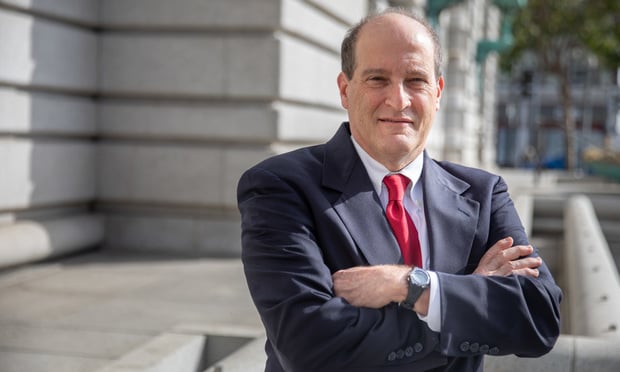Things Got Pretty Weird Between Neomi Rao and Doug Letter During the Mueller Grand Jury Hearing
Arguments delved into a make-believe gunfight and a potential government shutdown over redacted grand jury materials.
January 03, 2020 at 05:04 PM
6 minute read
The original version of this story was published on National Law Journal
 Douglas Letter, general counsel to the U.S. House of Representatives. (Photo: Jason Doiy/ALM)
Douglas Letter, general counsel to the U.S. House of Representatives. (Photo: Jason Doiy/ALM)
A federal appeals judge and the top House attorney tangled over what would happen if the Justice Department didn't hand over grand jury information redacted from the Mueller report, resulting in the House lawyer conjuring up a hypothetical gunfight between lawmakers' top security enforcer and the attorney general's security detail.
With the House and Trump administration repeatedly fighting over subpoenas, Democrats have shied away from the House using its contempt powers or having the chamber's sergeant-at-arms penalize those who don't comply with congressional mandates for information. But House general counsel Douglas Letter found himself describing that scenario during a high-profile hearing Friday at the U.S. Court of Appeals for the D.C. Circuit.
Judge Neomi Rao noted that the grand jury secrecy rule, which the Justice Department has invoked to block the House from reviewing information blacked out of former special counsel Robert Mueller's report, doesn't explicitly state that the Justice Department could be compelled to hand over the materials.
And Rao, a former Trump administration official appointed to the bench last year, asked Letter, hypothetically, what would happen if a court authorized the release of the information but didn't directly order the DOJ to provide it to House Democrats.
Letter appeared taken aback by the suggestion. If the Justice Department refused to turn over that information in spite of a court order authorizing its release, Letter said the House might have little choice but to send its sergeant-at-arms to the Justice Department to collect the materials.
Their exchange then went to a strange place.
"If this court rules the House is entitled to this material, the attorney general is going to say no?" Letter asked.
Letter then, half-jokingly, envisioned the sergeant-at-arms getting in a "gunbattle with Mr. Barr's FBI security detail."
But Rao said she wasn't asking about what the House might do. Rather, she pressed Letter over exactly what the grand jury rule entailed and whether a district court had the power to compel the Justice Department to release the material.
"I have to admit I have never thought of this before," Letter said. "I guess because as a Justice Department attorney, I think I would have been embarrassed to stand up here and say if a 6(e) order was issued, the Justice Department would not comply with it."
And he said the other two remedies for the House—the sergeant-at-arms forcibly retrieving the information or forcing a government shutdown—shows why lawmakers have to go to court to get the material.
While he jested about the gunbattle, Letter made clear the House is serious about its right to see that secret information in the Mueller report, labeling the prospect of the DOJ defying a court order authorizing the release of the information "stunning" and "unfathomable."
 Mark Freeman of the Justice Department's Civil Division.
Mark Freeman of the Justice Department's Civil Division.When Rao earlier asked the same question of Justice Department lawyer Mark Freeman, he said he couldn't give an answer on behalf of the attorney general and would have to "take it back" to the DOJ.
Letter also noted that Chief District Judge Beryl Howell had ordered the Justice Department to turn over the materials, after Rao pointed out that request wasn't explicitly made by the House in its lawsuit.
"You were lucky, I guess," Rao said.
The Democratic-controlled House Judiciary Committee filed suit for the grand jury information redacted from Mueller's report last year, saying it was key to lawmakers' decision on whether to impeach President Donald Trump. Howell agreed in an opinion and order issued in October that required the DOJ to present the materials to certain members of Congress.
However, the House voted along party lines last month to impeach Trump for obstruction of Congress and abuse of power, charges stemming from the president's pushing of Ukraine to investigate his political rival, former Vice President Joe Biden, while withholding military aid from the country.
Lawmakers aren't ruling out passing additional articles against Trump related to the Mueller report. House lawyers now argue that they need those secret materials to make that final decision.
Earlier in Friday's arguments, Freeman conceded that the DOJ believes the House could petition the court for the grand jury information. But he said the materials could not be used for a Senate impeachment trial, as the House said in its briefs, because the district court order only applied to the decision-making process before the articles were drafted.
And he urged the three-judge panel to rule that the House hadn't shown a particularized need for the redacted information.
Judge Judith Rogers seemed skeptical of those claims. She said that, even if most of the grand jury secrets weren't redacted from the report, the blocked-out details could ultimately prove crucial to the House's probe.
"All we know is that a single sentence can be devastating, and can lead to both exculpatory and incriminating evidence," she said.
At the end of the hearing, Freeman called for Congress to enact a statute to specifically address its access to grand jury materials so that the courts are not forced into the role of "evidentiary gatekeeper" between the legislative and executive branches.
At an earlier argument, addressing whether former White House counsel Don McGahn could be forced to testify before Congress, Justice Department attorney Hashim Mooppan cautioned that the courts could be politicized and lose credibility if they came to regularly preside over "purely political" disputes between the executive and legislative branches.
Read more:
DOJ Tells 'Unelected and Unaccountable' Judges to Stay Out of Fight for McGahn Testimony
Donald Verrilli Returns to SCOTUS to Defend Obamacare
McGahn and Mueller: Meet The Attorneys and Judges Starring in the DC Circuit Arguments
DC Circuit Judges Rao, Griffith and Rogers Will Weigh Release of Mueller Grand Jury Materials
This content has been archived. It is available through our partners, LexisNexis® and Bloomberg Law.
To view this content, please continue to their sites.
Not a Lexis Subscriber?
Subscribe Now
Not a Bloomberg Law Subscriber?
Subscribe Now
NOT FOR REPRINT
© 2025 ALM Global, LLC, All Rights Reserved. Request academic re-use from www.copyright.com. All other uses, submit a request to [email protected]. For more information visit Asset & Logo Licensing.
You Might Like
View All
Trump's DOJ Delays Releasing Jan. 6 FBI Agents List Under Consent Order
3 minute read
Judge Grills DOJ on Trump’s Birthright Citizenship Executive Order

Perkins Coie Backs Challenge to Trump's Ban on Transgender Military Service
4 minute read
Selendy Gay Files Lawsuit Challenging Trump's Workforce Reclassification EO
2 minute readTrending Stories
- 1Ex-Starbucks GC Exiting Latest Role, Will Get Severance
- 2Family Law Special Section 2025
- 3We Must Uphold the Rights of Immigrant Students
- 4Orrick Picks Up 13-Lawyer Tech, VC Group From Gunderson Dettmer
- 5How Alzheimer’s and Other Cognitive Diseases Affect Guardianship, POAs and Estate Planning
Who Got The Work
J. Brugh Lower of Gibbons has entered an appearance for industrial equipment supplier Devco Corporation in a pending trademark infringement lawsuit. The suit, accusing the defendant of selling knock-off Graco products, was filed Dec. 18 in New Jersey District Court by Rivkin Radler on behalf of Graco Inc. and Graco Minnesota. The case, assigned to U.S. District Judge Zahid N. Quraishi, is 3:24-cv-11294, Graco Inc. et al v. Devco Corporation.
Who Got The Work
Rebecca Maller-Stein and Kent A. Yalowitz of Arnold & Porter Kaye Scholer have entered their appearances for Hanaco Venture Capital and its executives, Lior Prosor and David Frankel, in a pending securities lawsuit. The action, filed on Dec. 24 in New York Southern District Court by Zell, Aron & Co. on behalf of Goldeneye Advisors, accuses the defendants of negligently and fraudulently managing the plaintiff's $1 million investment. The case, assigned to U.S. District Judge Vernon S. Broderick, is 1:24-cv-09918, Goldeneye Advisors, LLC v. Hanaco Venture Capital, Ltd. et al.
Who Got The Work
Attorneys from A&O Shearman has stepped in as defense counsel for Toronto-Dominion Bank and other defendants in a pending securities class action. The suit, filed Dec. 11 in New York Southern District Court by Bleichmar Fonti & Auld, accuses the defendants of concealing the bank's 'pervasive' deficiencies in regards to its compliance with the Bank Secrecy Act and the quality of its anti-money laundering controls. The case, assigned to U.S. District Judge Arun Subramanian, is 1:24-cv-09445, Gonzalez v. The Toronto-Dominion Bank et al.
Who Got The Work
Crown Castle International, a Pennsylvania company providing shared communications infrastructure, has turned to Luke D. Wolf of Gordon Rees Scully Mansukhani to fend off a pending breach-of-contract lawsuit. The court action, filed Nov. 25 in Michigan Eastern District Court by Hooper Hathaway PC on behalf of The Town Residences LLC, accuses Crown Castle of failing to transfer approximately $30,000 in utility payments from T-Mobile in breach of a roof-top lease and assignment agreement. The case, assigned to U.S. District Judge Susan K. Declercq, is 2:24-cv-13131, The Town Residences LLC v. T-Mobile US, Inc. et al.
Who Got The Work
Wilfred P. Coronato and Daniel M. Schwartz of McCarter & English have stepped in as defense counsel to Electrolux Home Products Inc. in a pending product liability lawsuit. The court action, filed Nov. 26 in New York Eastern District Court by Poulos Lopiccolo PC and Nagel Rice LLP on behalf of David Stern, alleges that the defendant's refrigerators’ drawers and shelving repeatedly break and fall apart within months after purchase. The case, assigned to U.S. District Judge Joan M. Azrack, is 2:24-cv-08204, Stern v. Electrolux Home Products, Inc.
Featured Firms
Law Offices of Gary Martin Hays & Associates, P.C.
(470) 294-1674
Law Offices of Mark E. Salomone
(857) 444-6468
Smith & Hassler
(713) 739-1250








